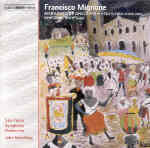BIS has done it again! If you’ve been collecting any of the marvelous unknown composers that this label has been advocating over the years, including Tubin, Tveitt, Klami, or (from this source) Guarnieri, then you’re going to love this fabulous new disc of music by Brazilian composer Francisco Mignone (1897-1986). He’s best known today for his shorter piano pieces, which appear on numerous Latin American keyboard music collections–but there’s much more to him than that. The son of Italian immigrants, Mignone’s music sounds like an Afro-Brazilian homage to Respighi, Puccini, and Stravinsky–but as happens so often in these cases, whatever he may lack in sheer originality he more than makes up for in melodic spontaneity and in finding a mix of ingredients that is his alone. This disc, which shows the work of a superb craftsman and an orchestrator every bit on the level of the three composers just mentioned, only whets the appetite for more–much more.
Festa das Igrejas (Church Festivals) dates from 1940, and as you might imagine it sounds a bit like Respighi’s Church Windows meeting his Brazilian Impressions. For the most part the music is atmospheric and gently subdued, with beautiful melodies strikingly scored for orchestra and prominent organ, the timbre of which is superbly melded with that of the larger ensemble. This makes the eruptive outbursts in the second and fourth movements all the more impressive, especially the latter, where Mignone literally pulls out all of the stops as the organ and an orchestra replete with harps, bells, and festive percussion brings the piece to a conclusion rivaling The Pines of Rome or Pictures at an Exhibition.
Indeed, big endings seem to be something of a Mignone specialty. Witness Sinfonia Tropical (1958), a stunning 20 minutes of Villa-Lobos in “Amazon” mode joining Stravinsky’s Firebird with a few Puccinian tunes tossed in for good measure. It’s so much fun to listen to that the crashing conclusion comes as something of a shock, even as we have to reluctantly admit that it sounds exactly right just where it is. Maracatu de Chico Rei (1933) is a stunning choral ballet describing the building of a church by a tribe of African slaves, some of whom win their freedom and gradually purchase the liberty of their fellows. Stravinsky’s The Rite of Spring pops up now and then, and a friend remarked with some justification that he was reminded of the more vigorous dances in Nielsen’s Aladdin Suite. The words are mostly fragments of sentences and nonsense syllables that, as in Ravel’s Daphnis et Chloë, add to the music’s atmosphere (at the close) of orgiastic abandon. Only one movement lacks vocal backing: the deliciously stylized “Gavotte of the White Princes” just before the finale. The contrast between its “Sugarplum Fairy” orchestration and its exuberant, primal surroundings is more than charming. Mignone really knew what he was doing.
So did conductor John Neschling and his São Paulo Symphony players and singers. They obviously had a blast with this music, offering the most vibrant, colorful, rhythmically vital and virtuosic performances imaginable. The cumulative intensity in Maracatu de Chico Rei is such that you may well break out into a sweat 10 minutes into it, and the performers relish every luscious timbral nuance in the softer, more atmospheric moments of all three works. Their achievement is supported at every point by state-of-the-art engineering, including perfect balances between the orchestra and organ in Festa das Igrejas, and an acoustic in which the numerous bold brass proclamations sound forth over a rich, velvety cushion of strings. And let’s not forget the roof-rattling percussion! If you care about any of the other composers mentioned during the course of this review, then waste no time treating yourself to this wonderful disc. Mignone stands proudly in their company, and as I said, we can only pray to hear more of him.
































